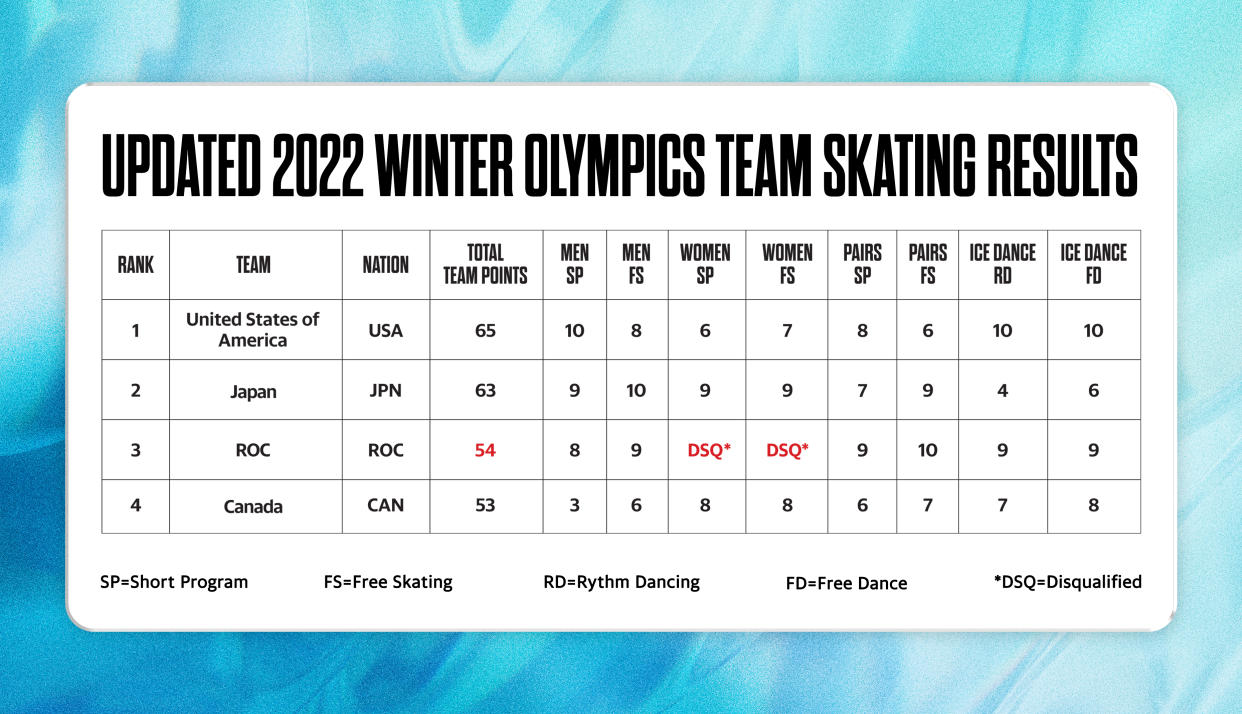Skating union verdict on Beijing 2022: Russia gets bronze despite Valieva DQ
Despite having one of its team members disqualified for use of a banned substance, the Russian skating team nonetheless still won a bronze medal at the 2022 Beijing Olympics.
That's the decision of the International Skating Union, tasked with arbitrating the final element of a two-year-old dispute involving Russian skater Kamila Valieva and three teams' worth of not-yet-awarded medals. It's a decision that will do little to end the controversy still enveloping the event, since the ruling means Canada's team will be denied the bronze medal.
Valieva, Russia's leading skater, was found to have taken a banned substance prior to the 2022 Games, and was retroactively banned for four years, dating forward from Dec. 25, 2021. That meant her scores during Russia's team skating were disqualified. Russia had won that event, but with the removal of Valieva's scores, the United States moved into the gold medal position and Japan into the silver slot.
The issue under dispute hinged on a technical interpretation of what should have happened next. The top 10 skaters in various team events are awarded points ranging from 10 (first place) to 1 (10th place). If Valieva was disqualified, in theory every skater should have moved up one slot. That would have given Canada enough points as a team to pass Russia for the bronze.

The ISU's own rules seemed to permit for such a reallocation. According to Section 353.4.a of the International Skating Union's Special Regulations & Technical Rules, "Disqualified Competitors will lose their placements and be officially noted in the intermediate and final results as disqualified (DSQ). Competitors having finished the competition and who initially placed lower than the disqualified Competitor(s) will move up accordingly in their placement(s)."
However, this particular rule, as stated, applies to individual and pairs skating competitions. The rules elsewhere stipulate that rules for team competitions will be done "in consultation with the IOC." The ISU apparently used this loophole as a basis for their decision.
"The decision of the ISU Council with regard to the consequences to the official results of the Team event of Beijing 2022, clearly expressed in the ISU Statement of January 30, 2024, was based on a comprehensive evaluation from legal experts," the ISU said in a statement. "This evaluation was, in turn, founded on the applicable rules and principles that are specific to this OWG Team event and is, therefore, the only decision that complies with the CAS Panel’s award. For the sake of clarity Rule 353 para 4 in the ISU Special Regulations is not applicable in this case." The ISU did not offer any additional reasons why that rule is not applicable in this particular case.
"In any complex and extraordinary situation like this, the reallocation of points could negatively affect the relative team ranking, adversely impacting teams that had nothing to do with the incident in question," the ISU statement continued. "Therefore, we have to abide by the rules and principles."
It is unclear what "teams" the ISU might be referring to outside of Russia, as that is the only "team" that would be adversely impacted by removing Valieva's points and moving other skaters upward in the ranks.
A time and place for awarding the medals has not yet been determined, and further appeals are likely.


